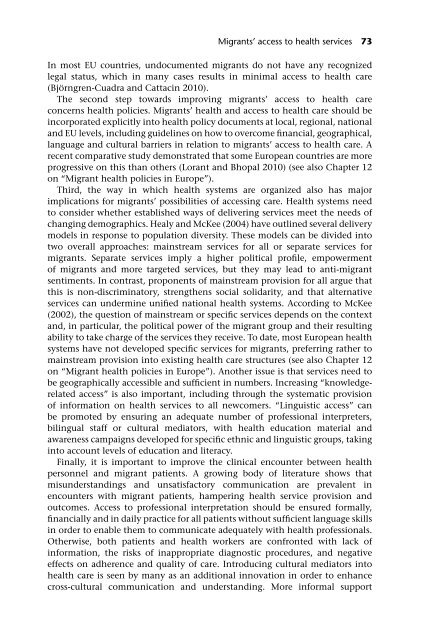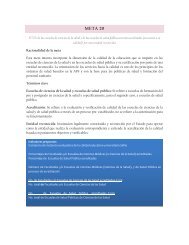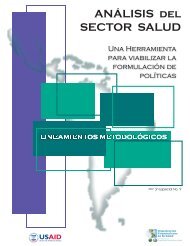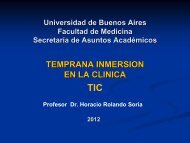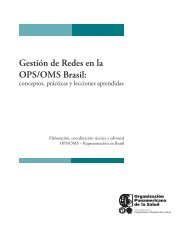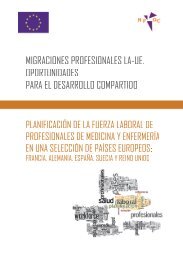English - World Health Organization Regional Office for Europe
English - World Health Organization Regional Office for Europe
English - World Health Organization Regional Office for Europe
Create successful ePaper yourself
Turn your PDF publications into a flip-book with our unique Google optimized e-Paper software.
Migrants’ access to health services 73<br />
In most EU countries, undocumented migrants do not have any recognized<br />
legal status, which in many cases results in minimal access to health care<br />
(Björngren-Cuadra and Cattacin 2010).<br />
The second step towards improving migrants’ access to health care<br />
concerns health policies. Migrants’ health and access to health care should be<br />
incorporated explicitly into health policy documents at local, regional, national<br />
and EU levels, including guidelines on how to overcome financial, geographical,<br />
language and cultural barriers in relation to migrants’ access to health care. A<br />
recent comparative study demonstrated that some <strong>Europe</strong>an countries are more<br />
progressive on this than others (Lorant and Bhopal 2010) (see also Chapter 12<br />
on “Migrant health policies in <strong>Europe</strong>”).<br />
Third, the way in which health systems are organized also has major<br />
implications <strong>for</strong> migrants’ possibilities of accessing care. <strong>Health</strong> systems need<br />
to consider whether established ways of delivering services meet the needs of<br />
changing demographics. Healy and McKee (2004) have outlined several delivery<br />
models in response to population diversity. These models can be divided into<br />
two overall approaches: mainstream services <strong>for</strong> all or separate services <strong>for</strong><br />
migrants. Separate services imply a higher political profile, empowerment<br />
of migrants and more targeted services, but they may lead to anti-migrant<br />
sentiments. In contrast, proponents of mainstream provision <strong>for</strong> all argue that<br />
this is non-discriminatory, strengthens social solidarity, and that alternative<br />
services can undermine unified national health systems. According to McKee<br />
(2002), the question of mainstream or specific services depends on the context<br />
and, in particular, the political power of the migrant group and their resulting<br />
ability to take charge of the services they receive. To date, most <strong>Europe</strong>an health<br />
systems have not developed specific services <strong>for</strong> migrants, preferring rather to<br />
mainstream provision into existing health care structures (see also Chapter 12<br />
on “Migrant health policies in <strong>Europe</strong>”). Another issue is that services need to<br />
be geographically accessible and sufficient in numbers. Increasing “knowledgerelated<br />
access” is also important, including through the systematic provision<br />
of in<strong>for</strong>mation on health services to all newcomers. “Linguistic access” can<br />
be promoted by ensuring an adequate number of professional interpreters,<br />
bilingual staff or cultural mediators, with health education material and<br />
awareness campaigns developed <strong>for</strong> specific ethnic and linguistic groups, taking<br />
into account levels of education and literacy.<br />
Finally, it is important to improve the clinical encounter between health<br />
personnel and migrant patients. A growing body of literature shows that<br />
misunderstandings and unsatisfactory communication are prevalent in<br />
encounters with migrant patients, hampering health service provision and<br />
outcomes. Access to professional interpretation should be ensured <strong>for</strong>mally,<br />
financially and in daily practice <strong>for</strong> all patients without sufficient language skills<br />
in order to enable them to communicate adequately with health professionals.<br />
Otherwise, both patients and health workers are confronted with lack of<br />
in<strong>for</strong>mation, the risks of inappropriate diagnostic procedures, and negative<br />
effects on adherence and quality of care. Introducing cultural mediators into<br />
health care is seen by many as an additional innovation in order to enhance<br />
cross-cultural communication and understanding. More in<strong>for</strong>mal support


